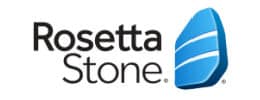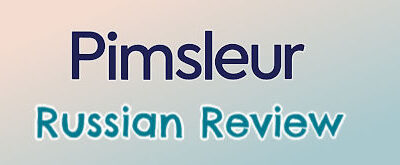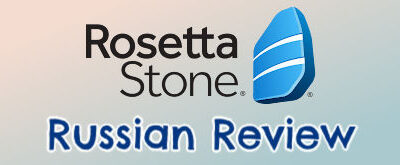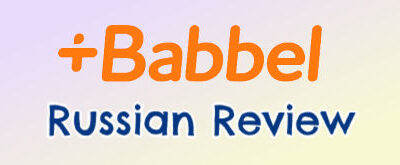Rosetta Stone has been a popular choice among language learners for more than three decades. However, that doesn’t necessarily mean that Rosetta Stone is the right program for you to learn German. In this article, our team covers the major pros and cons you need to be aware of before making a decision.
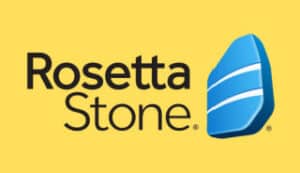
Rosetta Stone
- Multiple Subscription Options
- Money Back Guarantee
Pros
- Affordable monthly subscription plans ($10-$15/mo)
- Ideal German course for visual learners (lots of pictures)
- Learning method rooted in immersion
- Multitude of supplemental resources (i.e. short stories, on-demand videos)
- Modern, intuitive digital platform and mobile app
Cons
- Lessons can become repetitive at times
- No direct grammar instruction
- Basic speaking exercises
Video Review: Is Rosetta Stone German Worth It?
In the above video, Guide2Fluency team member Bianca breaks down our thoughts on Rosetta Stone’s German language course.
The Rosetta Stone Learning Method
In comparison to other German language programs, Rosetta Stone takes a slightly different approach. Their learning method is rooted in immersion, where learners are presented with images, audio, and text in the German language without the use of translations.
This is meant to simulate the way people learn their first, native language (i.e. by associating words and phrases with their meanings and contexts rather than relying on translations like you do with most other German language apps).
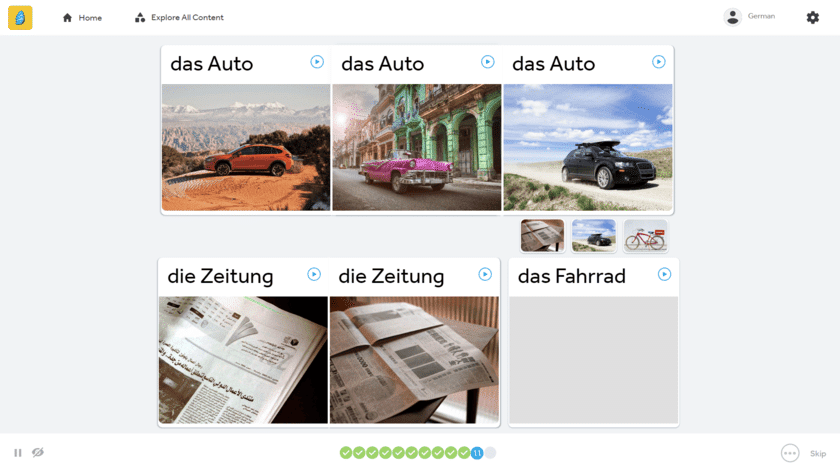
The idea here is that an immersive environment will accelerate the pace of learning since you’ll be constantly exposed to the language, which will result in faster progress and a more comprehensive grasp of German vocabulary, grammar, and usage.
That’s the Rosetta Stone learning framework in a nutshell – the company emphasizes immersion and interaction through imagery to help learners develop proficiency in the German language.
Rosetta Stone German Pricing
Rosetta Stone offers a few different subscription plans to choose from: two monthly options and one lifetime package. The monthly subscription options vary from call it $10 to $15 per month, and the lifetime option costs around $400.
However, it’s worth noting that the lifetime package also includes access to all Rosetta Stone languages (not just German).
Plus, keep in mind that Rosetta Stone regularly offers sales and special promotions, so you likely will not have to pay full price. In most cases, expect to receive anywhere from 10-40% off. For example, our team regularly sees the lifetime package slashed down below $200, believe it or not.
All in all, Rosetta Stone sort of lands near the middle of the pack in terms of cost. Their subscription plans are slightly more expensive than the likes of Babbel German, and Busuu, but cheaper than the likes of Rocket German and Pimsleur.
Pros Explained
Now that we’ve covered the Rosetta Stone learning method and pricing, let’s move into the pros and cons that our team uncovered as we tested this German language program.
Perfect For Visual Learners
Rosetta Stone is an excellent choice for visual learners. As we alluded to earlier, their entire German course is essentially built around imagery. In fact, pretty much every practice drill within the standard Rosetta Stone lessons incorporates some sort of image or picture.
Therefore, needless to say, if you tend to think in pictures and use visual imagery to remember information, then Rosetta Stone will likely mesh well with your learning style.
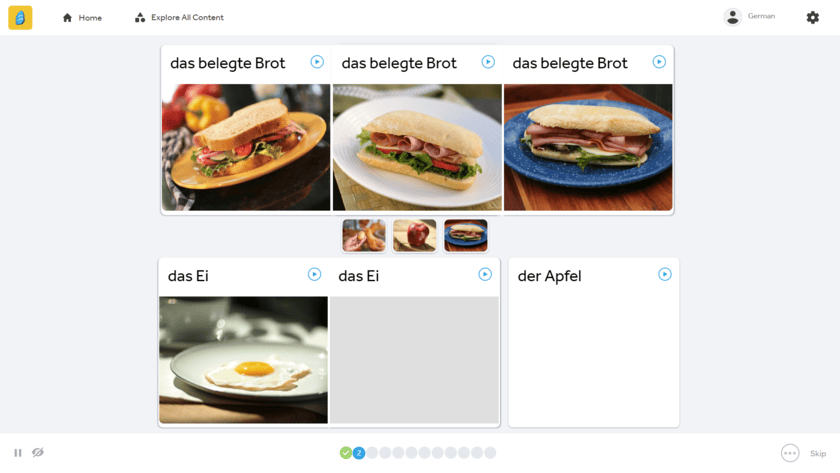
Plus, the company even provides supplemental on-demand video lessons as well, so between the standard lessons and the bonus videos, Rosetta Stone is easily the most visually appealing German program our team has tested, other than perhaps LingoPie, which relies solely on video.
Focus On Immersion
Rosetta Stone’s focus on immersion is highly effective for learning German. Yes, we know it can be frustrating, especially at first when you have no baseline understanding of the language, but in the long run, it really helps speed up the language acquisition process.
After all, when you are constantly surrounded by German words and phrases, your vocabulary expands rapidly, and more effectively than studying in a non-immersive setting since relying solely on translations can hinder your development of fluency in German.
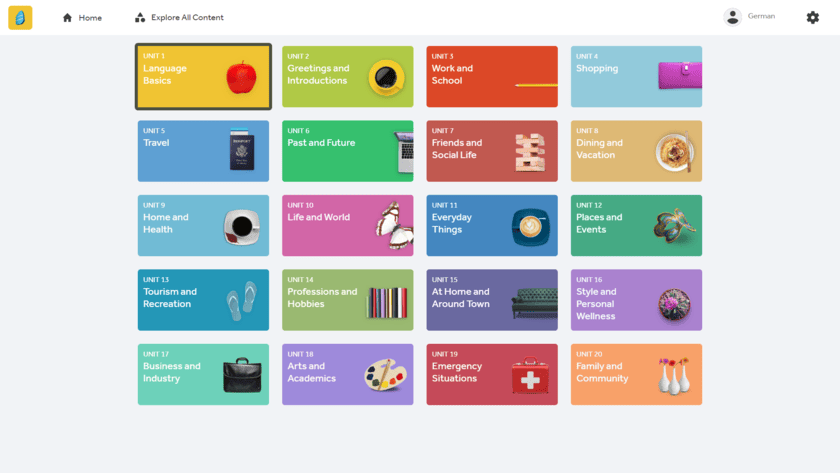
At the end of the day, language fluency involves thinking and expressing oneself directly in the target language, not mentally translating from one language to another, so from that perspective, we give Rosetta Stone’s learning framework two thumbs up.
TruAccent Speech Technology
Our team was thoroughly impressed with Rosetta Stone’s speech recognition software. It’s clear the company has invested serious resources to ensure their speech tool is quick, accurate, and easy-to-use.
As you complete the various drills within the Rosetta Stone lessons, you’ll be asked to listen and then repeat German words and phrases so that Rosetta Stone’s TruAccent technology can grade your pronunciation.
This is important because not only does good pronunciation make it easier for you to understand native speakers when they communicate with you, but improving your pronunciation also boosts your own confidence so that you feel comfortable speaking and using the language in social and professional settings.
Ultimately, all of these language learning companies use some sort of speech recognition tool, but Rosetta Stone’s is easily one of the best we’ve tested.
Bonus Learning Resources
We absolutely have to mention all the extra resources and tools Rosetta Stone offers beyond their standard lessons. So with the Rosetta Stone German course, learners also get free access to the on-demand videos we mentioned earlier, short stories, phrasebooks, audio companions, and more.
Of all these tools though, our favorite are the short stories, which are a great way to break up the standard lessons. Plus, what’s cool is that Rosetta Stone gives you flexibility here – you can simply listen to a fluent German speaker read you the story, you can read it silently yourself, or you can record yourself and then listen back to see how your pronunciation is progressing. Not to mention, the short stories cover all types of topics and themes so that you also gain a better understanding of German culture and places while you’re learning.
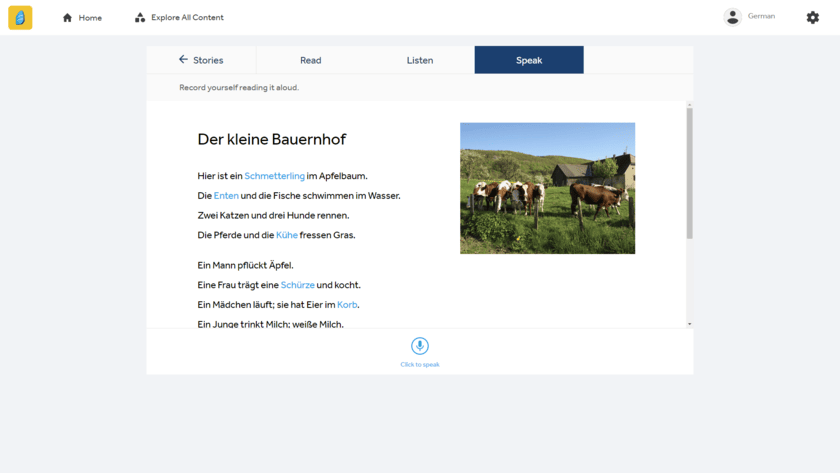
Lastly, we want to highlight Rosetta Stone’s live lessons, classes and tutoring. Now to be clear, these live sessions are not free like the company’s other resources. Unfortunately, they do cost extra, but honestly, we think they are worth it, especially once you start to reach an intermediate level of fluency.
Each session only lasts around 15 to 20 minutes, but they are a great way to interact with other learners at your level, and get your feet wet with real-world conversations.
Cons Explained
Now that we’ve covered the major pros, it’s only fair we also chat about the cons as well. That way you have a balanced view of the Rosetta Stone German program.
Repetitive Lesson Format
The first negative is that the Rosetta Stone lessons can become boring and monotonous at times, which is why the bonus resources and tools we just mentioned are so important.
Really, the standard Rosetta Stone lessons are just made up of the same 4 or 5 drills over and over again, so I guess at the end of the day, it really just depends on what type of learner or person you are as to whether this matters.
If you have a short attention span, and need to be constantly engaged, maybe an app like Babbel or Duolingo with their diverse set of practice exercises may be a better fit. However, if you’re more self-disciplined, it likely won’t matter as much.
Basic Speaking Exercises
The next negative has to do with Rosetta Stone’s speaking exercises, and while we like the company’s speech software, our concern more so has to do with the exercises themselves. To put it simply, they’re just basic, and really don’t evolve past the newcomer level.
Throughout the company’s German course, you’re really just asked to listen and repeat words and phrases independently. In other words, other than the images you are shown, there’s no context or pressure to use the language spontaneously under pressure, which is extremely important.
After all, without context, learners may struggle to understand how words and phrases are used in different situations. Plus, contextualized learning helps to anchor new information in meaningful contexts, which can aid in retention.
Therefore, the message here is that we wish Rosetta Stone’s speaking drills were more robust, sort of what like what the Rocket or Pimsleur programs offer with their simulated conversations.
Live Classes Are Pricey
This somewhat relates back to my previous point, but in order to get that real-world conversational practice and context, you’ll likely need to sign up for Rosetta Stone’s live lessons, classes or tutoring sessions.
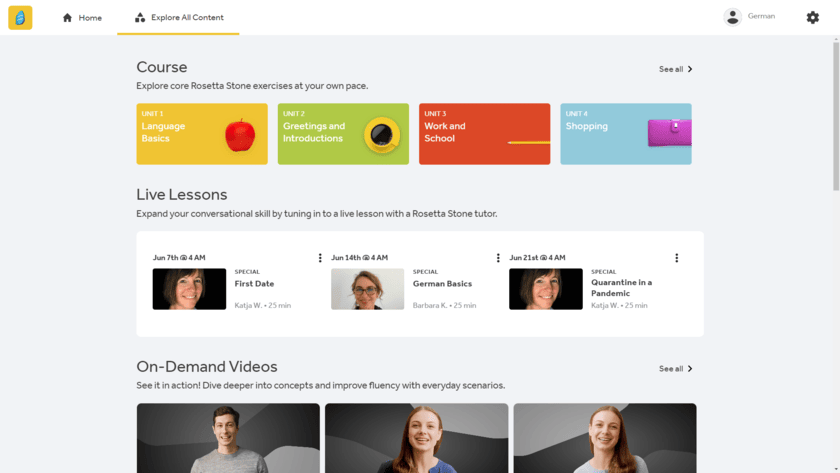
However, while these live, interactive sessions are great, the issue is that they are somewhat expensive, so keep this in mind if money is tight.
No Direct Grammar Instruction
Lastly, let’s talk grammar instruction, which is a sensitive subject among linguists. With Rosetta Stone, there is no direct grammar instruction. Instead, Rosetta Stone encourages learners to pick up grammar intuitively through exposure and practice. Or to put it differently, the company wants you to begin noticing patterns of grammar naturally yourself.
Now this may or may not be a good thing depending on which side of the fence you sit on. Some linguists and language learning companies believe that direct instruction provides clear explanations of grammar rules and structures, which can help learners understand the underlying framework of the German language, which in turn make it easier for learners to grasp new concepts and apply them correctly.
However, other language experts and companies, like Rosetta Stone for example, firmly believe that instead of focusing on memorizing rules, learners who acquire grammar naturally tend to develop a more intuitive feel for the language.
Therefore, it just depends on what you believe in. If you want direct, easy-to-digest grammar instruction, Rocket German would likely be a better choice for you. However, if you want to pick up German grammar naturally, Rosetta Stone is an excellent choice.
Verdict: Is Rosetta Stone Good For Learning German?
After throughly testing the program, our team beleives that Rosetta Stone is a good choice to learn German. After all, the company wouldn’t be around for more than three decades if their product was not effective.
Sure, our team has a few minor grievances with their German program, like the fact their lesson format is somewhat repetitive, their speaking exercises are more basic in nature, and their live classes are pricey, but other than that, we agree that Rosetta Stone is highly effective, especially if you consider yourself a visual learner.
All in all, we like Rosetta Stone’s immersive approach to learning, their speech software is top-notch, and they provide a boatload of extra resources and learning tools, which is why we put Rosetta Stone near the top of our list for best apps to learn German.
After testing the Rosetta Stone German program, our team thinks it is a great choice for visual learners given the fact their course relies heavily on immersion and imagery. Unfortunately, if you are an auditory learner, there are likely better choices on the market to help you learn German.
You can likely learn the basics of the German language and begin holding short conversations after spending around 80 to 100 hours using the Rosetta Stone German course. You can expedite the language acquisitions process though by signing up for the live lessons offered by Rosetta Stone.
After completing the Rosetta Stone German course, expect to reach an intermediate level of fluency (B1 or B2 according to the CEFR language levels). In order to reach an advanced level of fluency, you will likely need more real-world conversational practice.

